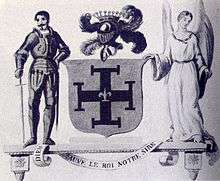Noblesse oblige
Noblesse oblige (/noʊˌblɛs əˈbliːʒ/; French: [nɔblɛs ɔbliʒ]) is a French expression used in English meaning that nobility extends beyond mere entitlements and requires the person who holds such a status to fulfill social responsibilities. For example, a primary obligation of a nobleman could include generosity towards those around him.
| Look up noblesse oblige in Wiktionary, the free dictionary. |
The Oxford English Dictionary states that the term suggests "noble ancestry constrains to honourable behaviour; privilege entails responsibility."
The Dictionnaire de l'Académie française defines it thus:
- Whoever claims to be noble must conduct himself nobly.
- (Figuratively) One must act in a fashion that conforms to one's position and privileges with which one has been born, bestowed and/or has earned.
Meaning and variants
"Noblesse oblige" is generally used to imply that with wealth, power, and prestige come responsibilities.
In ethical discussion, it is sometimes used to summarize a moral economy wherein privilege must be balanced by duty towards those who lack such privilege or who cannot perform such duty. Finally, it has been used recently to refer to public responsibilities of the rich, famous and powerful, notably to provide good examples of behaviour or to exceed minimal standards of decency. It has also been used to describe a person taking the blame for something in order to solve an issue or save someone else.
History and examples

An early instance of this concept in literature may be found in Homer's Iliad. In Book XII, the hero Sarpedon delivers a famous speech in which he urges his comrade Glaucus to fight with him in the front ranks of battle. In Pope's translation, Sarpedon exhorts Glaucus thus:
'Tis ours, the dignity they give to grace
The first in valour, as the first in place;
That when with wondering eyes our confidential bands
Behold our deeds transcending our commands,
Such, they may cry, deserve the sovereign state,
Whom those that envy dare not imitate!
In Le Lys dans la Vallée, written in 1835 and published in 1836, Honoré de Balzac recommends certain standards of behaviour to a young man, concluding: "Everything I have just told you can be summarized by an old word: noblesse oblige!"[1] His advice had included comments like "others will respect you for detesting people who have done detestable things."
The phrase is carved into Bertram Goodhue's Los Angeles Public Library on a sculpture by Lee Lawrie as part of Hartley Burr Alexander's iconographic scheme for the building.[2][3]
Critique
Noblesse oblige, while seeming to impose on the nobility a duty to behave nobly, conveniently provides the aristocracy with an apparent justification for their privilege. This argument is "as nobles, we have rights, but we have duties also; and such duties thereby validate our rights". By contrast, jurists such as Dias and Hohfeld have pointed out that rights and duties are jural corelatives, [4] which means that if someone has a right, someone else owes a duty to him. This reasoning of Dias' was used in Murphy v Brentwood District Council (1991) to disapprove Lord Denning MR's judgment in Dutton v Bognor Regis Urban District Council (1972).
See also
References
Notes
- (English translation: Lily of the Valley)
- Lawrie, Lee, Lee Lawrie: Sculpture, J.H. Jansen, Cleveland, Ohio, 1936
- Masters, Margaret Dale, Hartley Burr Alexander: Writer-in-Stone, Jacob North Printing Company, Lincoln, Nebraska, 1992, pp. 54-55
- Dias, Reginald Walter Michael (1976). Jurisprudence. OCLC 2668655.
Sources
- Oxford English Dictionary (1989). New York: Oxford University Press.
- Roberts, Jennifer Tolbert (1994). Athens on Trial: The Antidemocratic Tradition in Western Thought. Princeton, New Jersey: Princeton University Press. ISBN 9780691029191.
- The Scarlet Pimpernel (film, 1982). London Film Productions Limited. 2003 DVD ID#191LFDVD.
Further reading
- Athens on Trial: The antidemocratic tradition in western thought (Jennifer Tolbert Roberts, ISBN 0691029199, October 2011)